Croatia is One Step Closer to Introducing Digital Nomad Visa
November 11, 2020 – Last week, the Croatian government took the first step to introducing a digital nomad visa. In his statement, Prime Minister Andrej Plenković pointed out that the Law on Foreigners, under which the digital nomad visa is regulated, is an important law.
As Lider Media / Nikolina Oršulić reports, the first concrete regulatory steps have been taken to legalize the residence and work of digital nomads in Croatia. Namely, on Thursday, November 5, 2020, at the Government session, the final proposal of the Law on Foreigners was adopted, which will be sent to the Croatian Parliament.
"I think this is an important law. We are among the first countries to legally regulate the issue of digital nomads, and this will be accompanied by appropriate changes to the law in the tax domain, as well as in the health insurance domain," said Prime Minister Andrej Plenković, announcing further legislative steps.
The idea of launching digital nomad visas was first presented in Croatia by Dutch entrepreneur Jan de Jong, who has been building new business opportunities in Croatia for more than a decade.
"I can say that I am satisfied with the pace at which we are working to bring the legislative package needed to attract digital nomads to Croatia. We are currently making great steps forward in answering health insurance questions. With the Prime Minister's statement, we have an official obligation from the highest political level to continue to make extraordinary efforts to adapt the laws regarding taxation and health insurance. I am happy that Croatia will become the leading country in the world in attracting digital nomads," said the entrepreneur for Lider Media.
The legislative story has heated up, so the initiator of introducing a digital nomad visa is already working on the next step – the establishment of a kind of central point to support digital nomads.
"Since we are going in the right direction, I am working on establishing the Croatian Association for Digital Nomads (Digital Nomad Association Croatia - DNA Croatia) whose mission will be to connect digital nomads in Croatia and support them. We are currently in the process of founding this association," said de Jong, who is entering the project with Tanja Polegubić, a returnee from Australia who runs Saltwater Nomads - remote work and lifestyle services for digital nomads in Split, and Karmela Tancabel, a member of the Ilok Cellars (Iločki podrumi) Marketing and Export Board.
The plan is to complete the legislative part to introduce a digital nomad visa by the end of the year, and visas should be available in the first quarter of 2021. In addition to the legal regulation of the status of digital nomads, the draft of the Law on Foreigners brings some other changes.
"The most important novelty is prescribing a new model of employment of foreigners, according to which the employer must first request the implementation of the labor market test from the Employment Bureau to find labor on the domestic market. If there are no unemployed in Croatia, then a request is sent to the Ministry of the Interior seeking an opinion from the Croatian Employment Service. Exceptions to this test are for deficit professions that are usually used during the season," said Interior Minister Davor Božinović at the Government session.
In the draft of the Law on Foreigners, a digital nomad is defined as a third-country national who is employed or performs business through communication technology for a company or own company that is not registered in the Republic of Croatia and does not perform work or provide services to employers in the Republic of Croatia.
For the latest about the digital nomad scene in Croatia, follow the dedicated TCN news section.
Valamar Invites All Digital Nomads to Istria and Krk Island
October 23, 2020 - Valamar invites all digital nomads to Istria and Krk Island as part of its 'long stay offer,' valid until March 2021.
Valamar is the latest to include a "long stay offer" or accommodation rental for at least one month, which is valid from September 30, 2020, to March 31, 2021.
HRTurizam reports that the special offer can be used in two Valamar camping resorts that are open all year round - Istra Premium Camping Resort 5 * in Poreč and Ježevac Premium Camping Resort 4 * on the island of Krk.
"The service of renting mobile homes for longer stays in Valamar's camping resorts is ideal for all guests who want to change the current location of their offices and allow themselves or their employees to work in nature with a fast internet connection," says Bruno Radoš, director of camp operations and regional director at Valamar.
In the package of services at the Istra Premium Camping Resort, guests will be able to use the free shuttle service and use the saunas, indoor pool, and gym at the nearby Valamar Diamant Hotel & Residence. The camp also has a Stay Fit program for exercise, fitness, and recreation through which they will be guided by coaches and other types of sports recreation and entertainment.
The offer also includes a modern camping home by the sea, high-speed internet connection (200/200 Mbit / s), premium family facilities, organized entertainment for children within the Maro Club, Multimedia Game Lounge, and Istra Theater.
"A longer stay in Valamar's camping resorts is ideal not only for guests who want to relax but also for companies that want to provide their employees with the opportunity to move their offices and stay in nature by the sea this fall and winter. When, in addition to all the services and benefits we provide to our guests, we add the excellent price of the accommodation package, which starts at 450 euro per month, we believe that guests will recognize a great opportunity for a long-term stay at sea," added Radoš.
Guests who decide to spend a longer period in Ježevac Premium Camping Resort on the island of Krk also expect opportunities for recreation on the multi-purpose sports field and rich facilities in the Multimedia Game Lounge - an entertainment zone with video games.
There is also a great complement to Valamar's online store Valfresco Direkt with free delivery of ready meals and groceries.
Thus, Valamar joined the new "long stay" trend of opening hotels according to the workspace model, following other global hotel chains, such as Hilton, Marriot, InterContinental, and many others. Also, Booking com and Airbnb have recently introduced options for longer stays in accommodation facilities.
"Digital nomads promote a new way of working and living, and we invite all those who simply want to change their place of residence for a while to come to Istria and the island of Krk and make a good and relaxing use of the coming months," concluded Radoš.
Interestingly, when we look at the bigger picture, Valamar is targeting families, digital nomads, and digital companies that can move their office to the modern campsites.
To read more about digital nomads in Croatia, follow TCN's dedicated page.
5 Reasons Why the Croatian Digital Nomad Visa Should Exist
August 22, 2020 - The Digital Nomad Visa has become a hot topic of late. It is especially relevant right now, during the pandemic when a large number of people are working from home. Jan de Jong, a Dutch entrepreneuer in Croatia spoke to Lider and provided 5 reasons why the Digital Nomad Visa (DNV) should be implemented.
1. Projections claim that by the year 2035, there will be a billion digital nomads in the world - highly skilled individuals who are paid above average or very well, who determine their work locations themselves.
2. A visa for digital nomads would bring people from all over the world to Croatia throughout all 12 months of the year, which would enable Croatia to become a year-round tourist destination.
3. According to a survey conducted by Karoli Hindriks, nine out of ten digital nomads may choose to come to your country if you establish special visas for them.
4. A state-of-the-art and mobile workforce are ready to temporarily settle in your country and strengthen the economy with their consumer power, skills, and knowledge. The first countries to open up to them will reap huge benefits.
5. Digital nomads become a huge marketing machine to promote the country when they start writing blogs, recording bets, tweeting, and posting on social networks about Croatia and thus attract more people.
As Jan previously stated, digital nomads would be important for Croatia in terms of marketing, because they would share their experiences, videos, and photos with their friends, and also on social networks, which would be free promotion. Plus, this would be a great way to start 2021.
Read more about the challenges and opportunities for developing the digital nomad sector in Tanja Polegubic's excellent 10 Ways Croatia Will Be At The Forefront of Countries with a Digital Nomad Visa (DNV).
For the latest travel info, bookmark our main travel info article, which is updated daily.
Read the Croatian Travel Update in your language - now available in 24 languages
Join the Total Croatia Travel INFO Viber community.
Why Zagreb is Increasingly Attractive to a Growing Number of Digital Nomads
January 22, 2019 - As more tourists discover the diverse attractions of Zagreb, 10 reasons why it is becoming an increasingly popular destination for the digital nomad revolution.
It has been another great year for tourism Zagreb, with 12% more arrivals and 11% more overnight stays during Advent in Zagreb the icing on the cake for a successful 2019. But in the increasingly competitive world of tourism, one must always stay ahead of the game and adapt to trends for the future. And the good news is that Zagreb is ideally placed – and already enjoying the early benefits – to take advantage of a growing tourism trend of the future.
Digital Nomads.
Before we investigate why Zagreb is fast becoming a digital nomad hotspot, it perhaps makes sense to define what a digital nomad is, how this type of tourism works, and what the size of the potential market is.
People often confuse digital nomads with bloggers and influencers. And yes, these types of people are digital nomads, but they make up just a tiny piece of this nomadic community. A digital nomad is simply someone who works digitally, or remotely. As long as they can plug in to an internet connection and do their job, they are considered a digital nomad. That could be a journalist, such as myself, who spends most of his time working from cafes and friends' living rooms, or it could be an IT specialist whose company allows him to work from home.
The clearest example of how this works in the Croatian context was demonstrated by two digital nomads I met in Jelsa on Hvar last year. He was Russian, she was Ukrainian, and they both worked for an IT company in Munich. Their boss had told them that he only needed them physically in Munich 2 months a year, and they were free to work from home, or anywhere else, as long as they were available and online from the working hours of 09:00 to 17:00.
They decided to do a European tour of Croatia, Italy, Spain and Portugal, choosing Jelsa from April 1 to June 30. Their day started with a swim and coffee on the main square, then to work online in Munich. Lunch in a Jelsa restaurant, back online in Munich until 17:00, then off for a swim and an evening of entertainment in Jelsa.
Working in Germany, living and spending in Croatia. For three months, out of season.
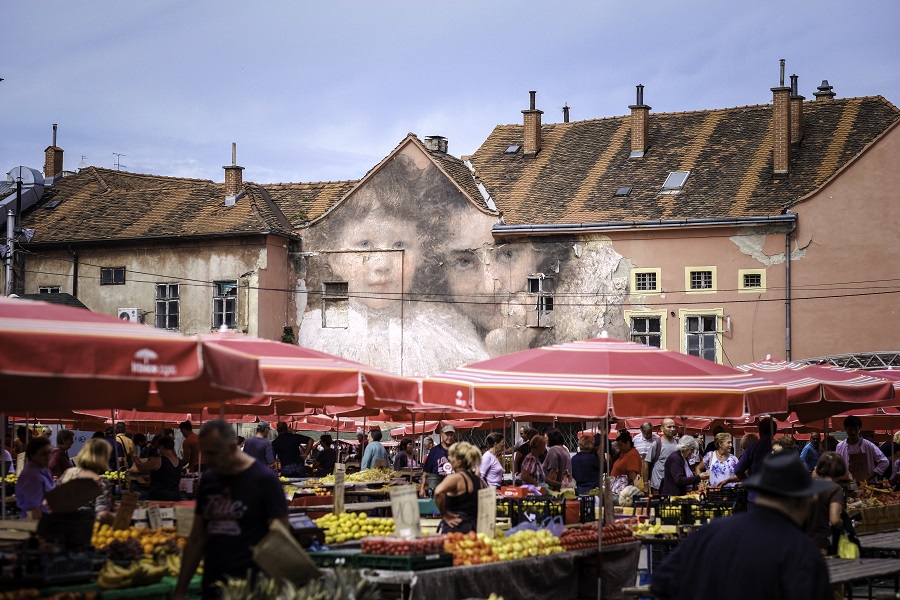
(Photo credit: S. Kastelan/Zagreb Tourist Board)
With the rise of the remote workplace, it is estimated that there will be one BILLION digital nomads in the world by 2035. With fewer places in Europe offering a better lifestyle that Zagreb and Croatia, imagine if 3% of that number chose Croatia – the 30 million longer-term arrivals (not dependent on a peak season) would stay longer, spend more, and contribute more to the community than the correct record number of tourists.
Tanja Polegubic is a Croatian-Australian returnee at the forefront of the digital nomad revolution, and she believes Croatia to be one of the up and coming digital nomad destinations in Europe, and a stop in Zagreb essential.
“Zagreb is a strong symbol and the heart of Lijepa Nasa. It’s also an eco-friendly city, with the iconic blue trams and a very walkable centre an ideal place for the car-less and carbon-conscious digital nomad.”
Tanja founded Saltwater in 2017, catering to digital nomads coming to the Croatian coast. On a remote working mission, she has also launched Virtualis Group (an IT, finance and engineering outsourcing partner) working remotely with clients in Australia, and partnerships with Zagreb-based businesses.
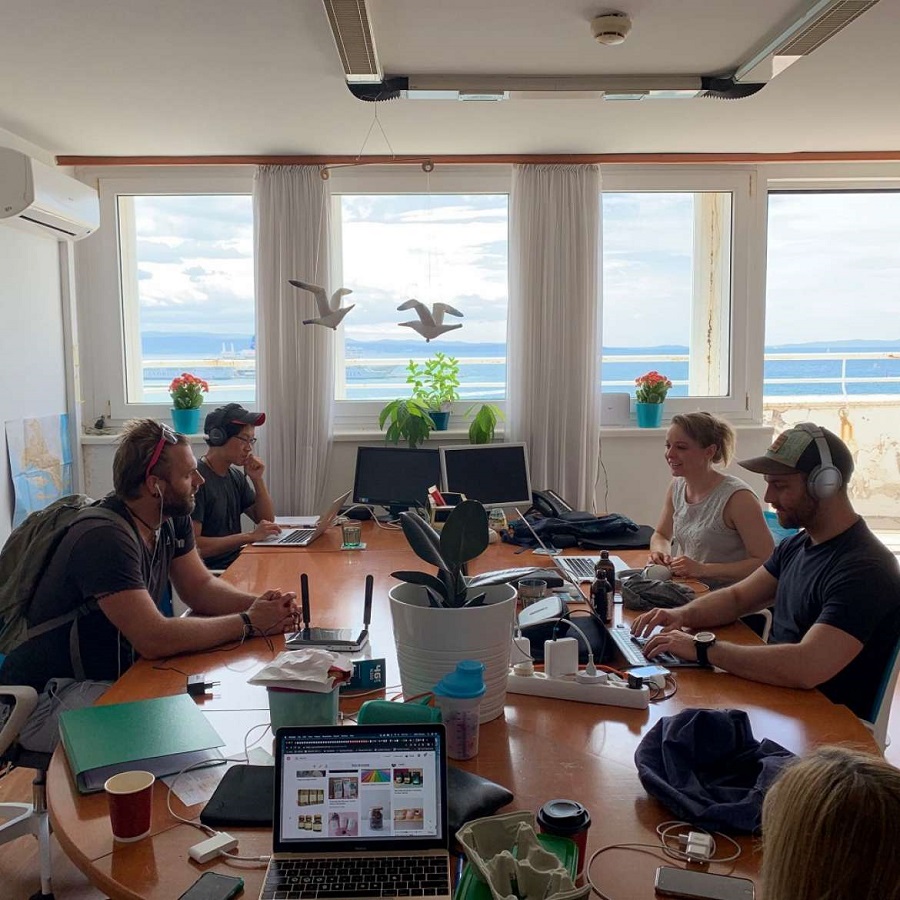
(Tanja's Saltwater co-working space)
“Our business meetings in Zagreb in October and November 2019 were very fruitful. Zagreb is easy to get around, meet clients and find talented collaborations. The connections into the country through the new airport are good - everywhere from Europe to the Middle East and Australia.
“The internet speeds are actually quicker than Australia’s nightmare of “NBN”- so it was with pride to actually show how ahead it is, compared to a country which should be áhead.”
Tanja has been coming and going from Australia for years, often stopping in Zagreb. She was able to base in Croatia as a remote working digital nomad early on in this now mainstream flexible work style. The many benefits to being a digital nomad in Croatia made her decide to service this audience, and ensure remote working is a possibility for all - Saltwater is for incoming digital nomads, and through Virtualis, which employs locals - enabling them to work remotely, and not forced to migrate.
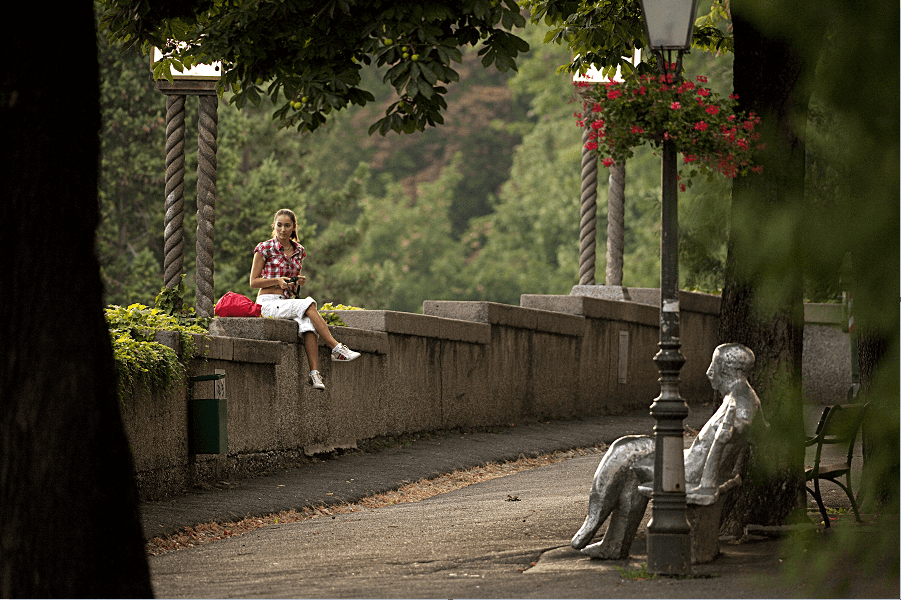
(Photo credit M. Vrdojak/Zagreb Tourist Board)
A special note on women:
“For women, Croatia in general - and of course it’s capital Zagreb - feels very safe and easy to get around. People are exceptionally helpful, and the level of English proficiency is high. Another advantage is certain beauty services are cheaper than in Australia. I often advise nomads, be they from the UK or New Zealand, to wait on getting things like hair done until here. It works out about 4 times cheaper.
“The other advantage across Zagreb is the numerous cafes - sitting, taking in the jovial atmosphere and getting a caffeine fix is fantastic. There’s also a growing number of specialty coffee places popping up - in Zagreb, I’m often at Cogito."
So what are the key things that digital nomads are looking for and Zagreb has to offer?
Schengen. A significant number of digital nomads from outside the EU, including many from North America. With the current visa regime of 90-day stays, this means that these high-spending nomads have to leave the EU for three months. Schengen visa holders can stay a maximum of 90 out of every 180 days, and so nomads are on the lookout for great destinations close to Schengen borders where they can hang out. With the likes of Budapest, Vienna and Ljubljana three Schengen capitals close by, it is not hard to see why Zagreb is an attractive destination for these kinds of nomads. Croatia is of course on the road to Schengen entry, but even after entry, the Schengen factor will still make Zagreb attractive, as it will be in the country closest to the border, and a last stop for those exiting.
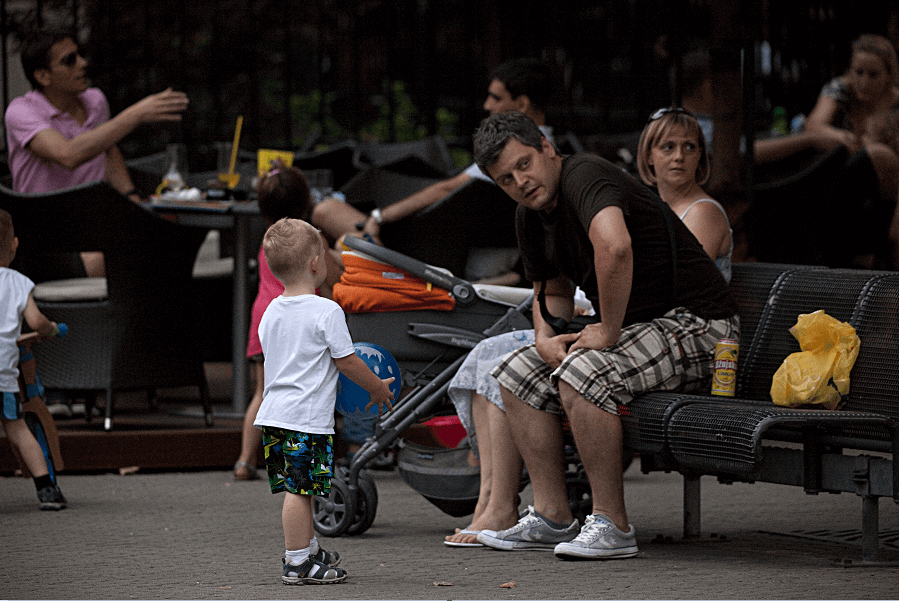
(Photo credit M.Vrdoljak/Zagreb Tourist Board)
Safety. Croatia is simply one of the safest countries in the world, with a very low crime rate. Zagreb is incredibly safe for a European capital city, and walking around late at night is not a problem. Many returnees from the diaspora cite the safety as one of the prime reasons to return and bring up children here. As Tanja mentions above, Zagreb and Croatia are increasingly attractive to single female nomads due to safety.
English language. The level of English spoken in Croatia, especially in the younger generation, is excellent. Already a tourist country with decades of experience with foreign visitors, English is also taught from an early age in schools. A recent global study found that Croatia had the second-best English in Central and Eastern Europe, and its rate of improvement was the second best in the world. German is also widely spoken.
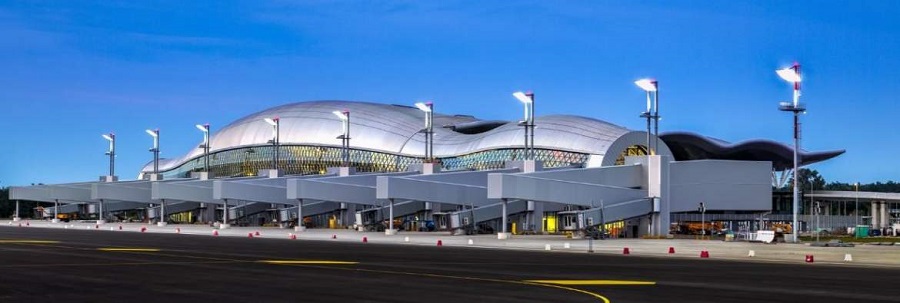
Accessibility. The opening of the new 330-million-euro airport terminal in 2018 finally gave Zagreb an airport worthy of the Croatian capital. The expansion of intercontinental routes in recent years means that Zagreb is connected to the world via the global networks of the likes of Qatar, Emirates and Turkish, while seasonal routes to far-flung places such as Toronto and Seoul add to the intercontinental connectivity. Zagreb is also served by several other big airports which increase arrival options, including Budapest, Ljubljana and Split.
Affordability. Zagreb is one of the most affrodable capital cities in Europe, and tourists are often pleasantly surprised at the affordability of essentials, from beer to public transport. For a detailed look at the cost of living in Zagreb, where better to look than this detailed video breakdown from a digital nomad couple?
Thriving tech scene. Given the nature of the digital nomad lifestyle, it is not surprising that a significant number of nomads come from the IT sector. This is another reason why Zagreb is increasingly attractive, as the city is a lively hub for a start up culture which is growing in importance.
A great tourist destination. Nomads are looking for great lifestyle and things to do, and so the fact that Zagreb is a top tourist destination in its own right, as well as being part of one of Europe's most exciting tourism countries only adds to the attraction. Zagreb itself offers tourism attractions and events right through the eye, culminating in its now-famous Advent in Zagreb. But the proximity of the Adriatic coast, Plitvice Lakes and range of historic towns, makes it an enviable base. It is said that Zagreb has the most museums per capita of any city in the world, and there are certainly some unusual ones to check out – The Museum of Broken Relationships, Museum of Illusions, and the newly-opened Museum of Hangovers spring to mind.

Great food and wine. Legendary food critic the late Anthony Bourdain famously called himself an idiot for knowing nothing about Croatia's 'world-class food, world-class wine, world-class cheese.' He is not alone, and visitors are often blown away by the quality and diversity of the regional cuisine of offer in Zagreb. A rapidly expanding international restaurant scene is helping to deal with expat cravings. As with the food, so too does Croatian wine stun the visitor. Among the 130 indigenous grape varieties is the original Zinfandel, and a short drive outside Zagreb will bring you to the sparkling wines of Plesivica, as good a bubbly as anything you will find outside Champagne. And if you are a wine-lover, how many other cities have you visited which have their very own wine road?

(Bagatin Clinic was named International Cosmetic Surgery of the Year 2019 at the International Medical Travel Journal Awards in Berlin last month)
World-class medical tourism for your budget. Medical tourism is on the rise, as people look for affordable healthcare with international quality. Perhaps you have never heard of the excellent reputation of Croatian medical tourism, but Zagreb boasts some world-class products at Zagreb prices. In the Croatian capital, for example, you can find the International Cosmetic Surgery Clinic of the Year 2019 (as voted by 20 independent experts from International Medical Travel Journal), three of the top six dermatological clinics in Europe, the first hospital in Europe performing the revolutionary Mayo Clinic co-sponsored RightMed pharmacogenetic test, and an outstanding eye surgery which has performed successful surgeries on the likes of Ivana Trump and Tim Roth.
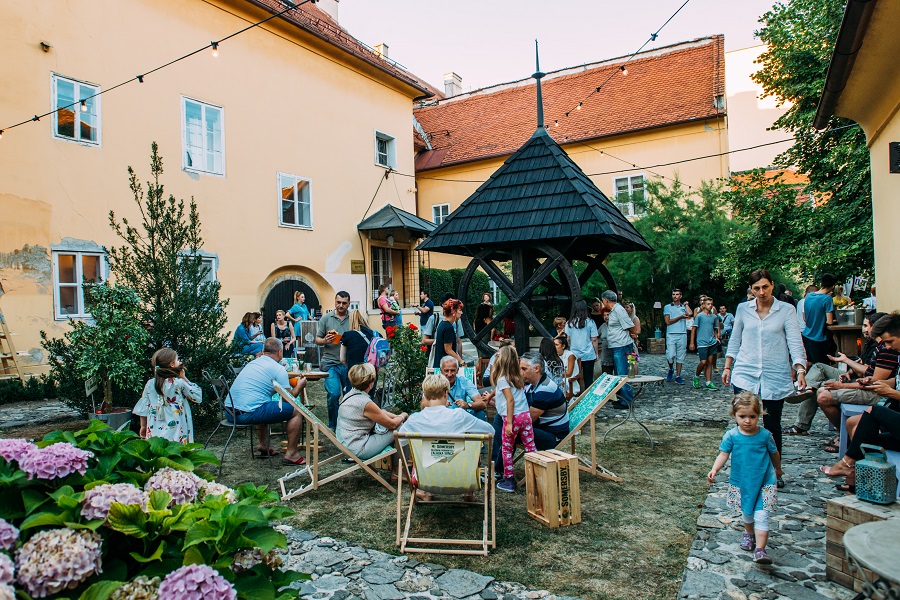
(Photo credit M. Vrdoljak/Zagreb Tourist Board)
The relaxed cafe lifestyle. But ultimately, it comes down to lifestyle. And there are few people who would disagree that the cafe culture lifestyle in Croatia is among the best in the world. As the Western world rushes into Starbucks for coffees to go, locals and laughing and gossiping in the cafes of Zagreb over an espresso which takes an hour. Along with safety, the lifestyle in Croatia is its biggest attraction. And lifestyle is the thing that digital nomads want most of all. As long as the internet connection is there and those jobs can be performed in Munich, London, Tokyo or San Francisco, why would you want to be a digital nomad anywhere else?
To read more about being a digital nomad in Croatia, especially for women, here is a great article Tanja wrote for TCN recently.
Digital Nomad Life in Croatia: Nicole Prybula, from Southern California to Split
August 22, 2019 - As the number of digital nomads rises globally, some are choosing to spend some of their time in Croatia. A new TCN series meeting international digital nomads calling Croatia their temporary home. Meet Nicole Prybula, from Southern California.
As recently featured on TCN, the world is projected to have a billion digital nomads by 2035, people from all over the world doing all manner of jobs and business with one thing in common - a flexible, mobile workplace connected to the Internet. If even a fracture of that number becomes a reality, the economic opportunity for countries which can attract these wealth-generating individuals has the potential to dwarf Croatia's current tourism revenues. And there are few countries better placed than Croatia to take advantage. Safe, beautiful, great gourmet scene, top tourist destination, English widely spoken, well connected to other destinations, and a superb lifestyle.
In order to look at the issue in more detail, we have decided to look at some of the digital nomads who have Croatia in their lifestyle plan, and to find out why Croatia, what Croatia offers, and what are the things that countries should be looking out for to take advantage of this economic opportunity. I am very grateful to Tanja Polegubic from Split's waterfront co-working space, Saltwater in Split (see location below) for her help in connecting me to various digital nomads using her space.
Our next digital nomad in Croatia is Nicole Prybula, who spent time in Split away from her native Southern California.
1. You are one of a growing number of digital nomads. Tell us briefly who you are and what you do.
I LOVE the sound of that - “I’m one of the digital nomads”. I have been dreaming of becoming a full out digital nomad for years and am so excited to be starting this journey in Split.
My name is Nicole - I’m a corporate event producer that started my own online business with a mission to ditch the 9-5 corporate America grind and start integrating work with life- creating a lifestyle where I can work whenever and from wherever I want.
For the first year, I grew my business from my home base of Southern California, but this year, decided it was time to really start living out my digital nomad dreams. So, I sold 95% of my belongings, put the rest in storage, and booked a one-way flight to Europe. For the next year (to start….), I’ll continue to grow my business but now while traveling the world.
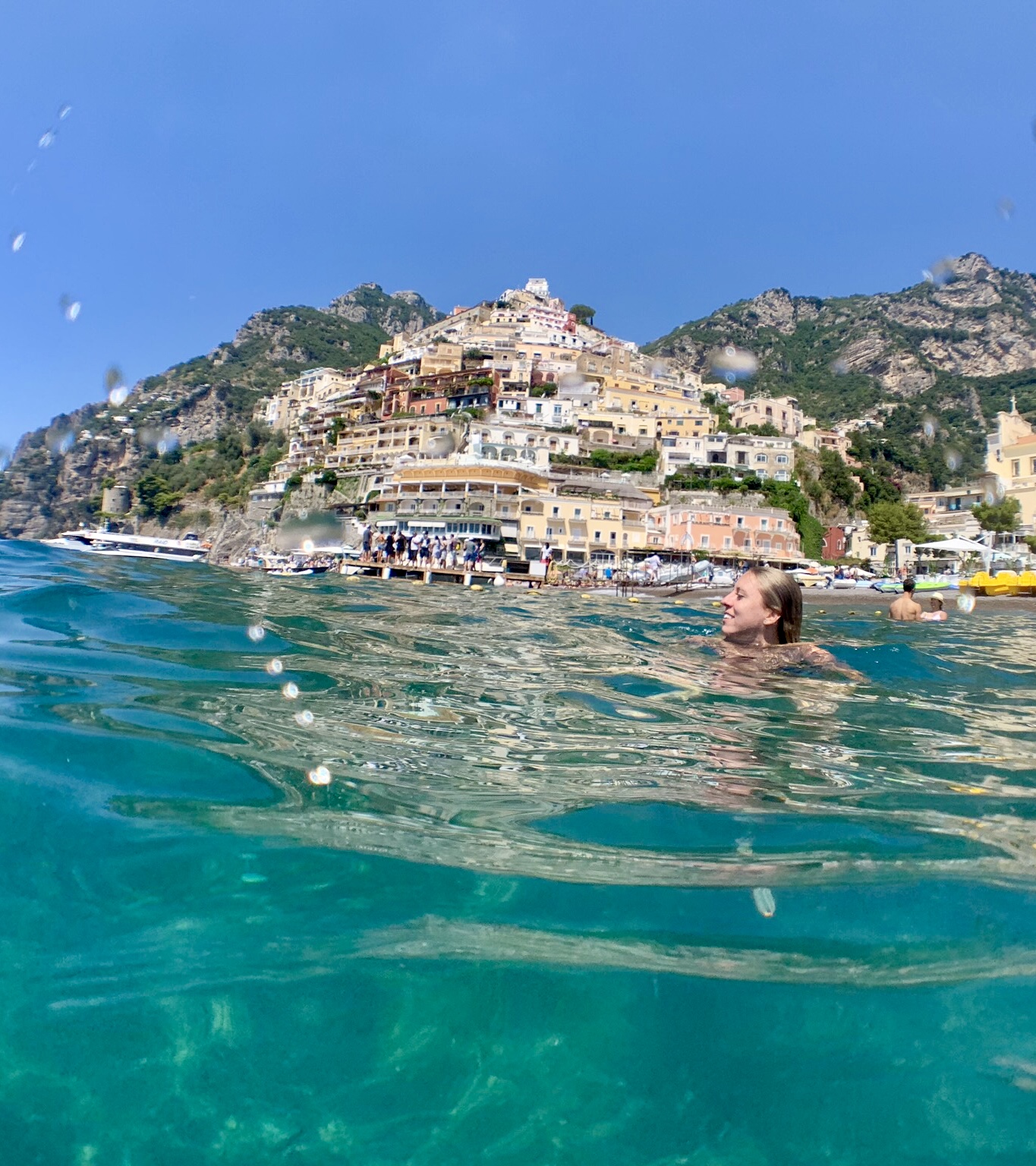
2. Working from your laptop rather than in an office seems like the dream lifestyle. What are the main pros and cons?
My favorite aspect of working remotely is having the freedom to change things up at any moment - whether its a change in scenery, a change in who I’m working with that day or a change in the culture I’m surrounded by. I love that I can now meet new people and explore new places any day of the week. Changing it up helps spark my creativity and continuously grow both professionally, and personally.
With that said, finding a suitable spot to work from when you first arrive at a new place can be challenging at times. While I love checking out different places, when the cafe does not have any electrical outlets or the hotel WiFi is too slow, you can waste some time hopping around in the beginning to find a good spot where you can stop and really get some work done.
3. Laptop living gives you the freedom to travel and choose your place to live. Where are the global hot spots currently for digital nomads?
So far, I have found that you can find digital nomads in any big city in Europe these days. Some hot spots I’m excited to check out next include Lisbon, Portugal and Budapest, Hungary.
4. You chose Croatia and specifically Split - why?
Ten years ago a couple of friends of mine visited Croatia, and while looking at their photos, I remember being in awe over the crystal blue waters - I had never seen anything like it! Croatia immediately moved to #1 on my bucket list.
I can’t believe it took me ten years to finally make it here, but my expectations have been exceeded, and the waters are truly as magical as I imagined they would be.
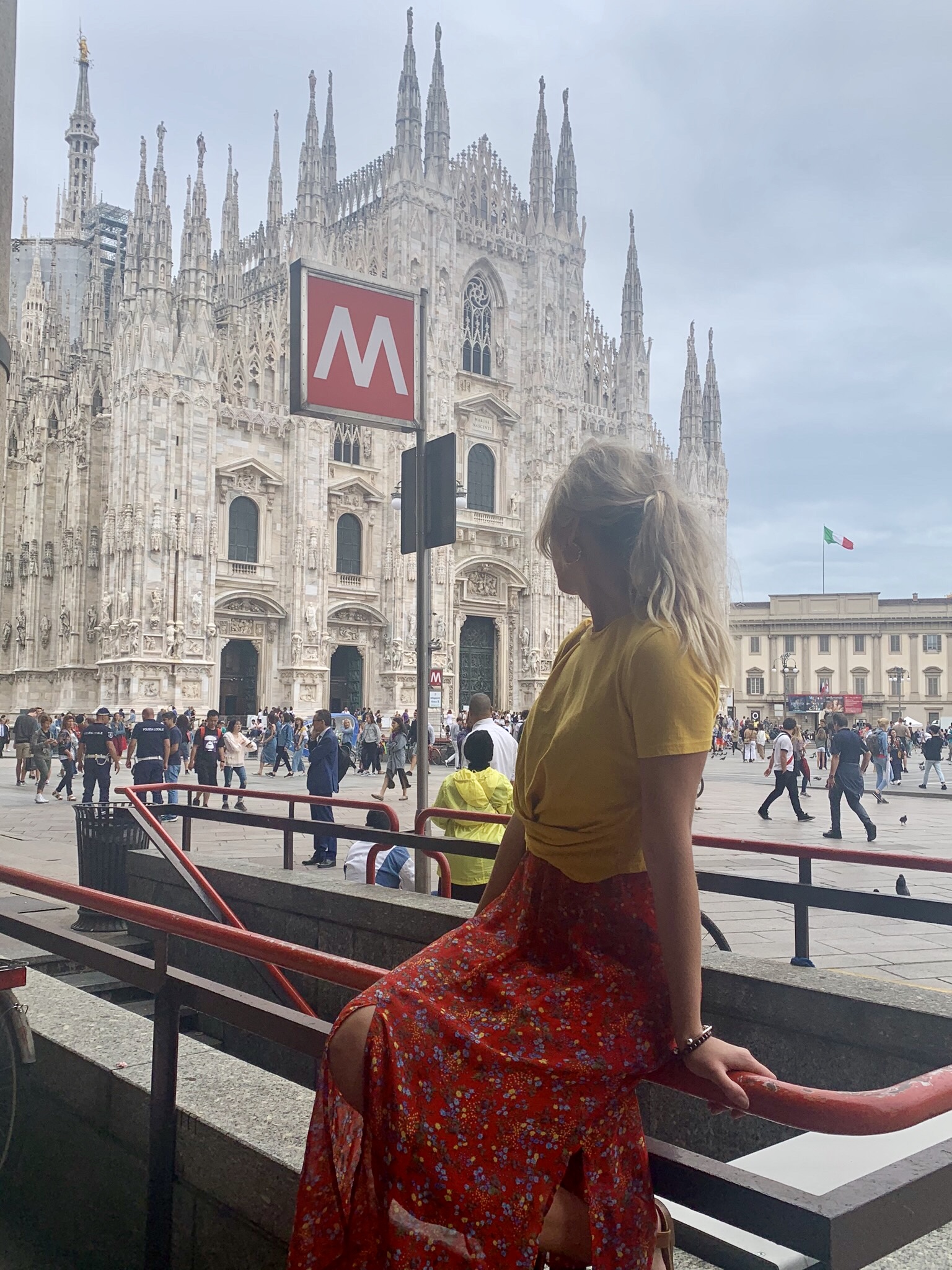
I chose Split specifically because I knew its digital nomad community would make it a great home base to settle for a few weeks, meet some locals and really integrate with the city. At the same time, its central location allows for some convenient day trips to still explore other parts of Croatia, such as Dubrovnik, Hvar Island, Krka Waterfalls & Plitvice Lakes National Park.
5. What are the most important things a destination should offer to be most compatible for the digital nomad lifestyle, apart from that all-important good WiFi?
The digital nomad journey can be isolating if you find yourself working alone in a cafe or your hotel every day - so coworking spaces or networking events where you can easily connect with locals and fellow digital nomads make that destination so much more enjoyable.
6. What are the competitive advantages that Croatia has to attract more digital nomads?
Croatia is truly the best of both worlds - for your work days, you have convenient transportation options for your commute, multiple coworking communities and tons of cafes to work from, minimal language barriers as English is widely spoken, and solid WiFi.
When you’re off of work, you can always find things to do, from exploring the spectacular national parks, relaxing at the gorgeous beaches or getting lost in the narrow alleys of ancient old towns.
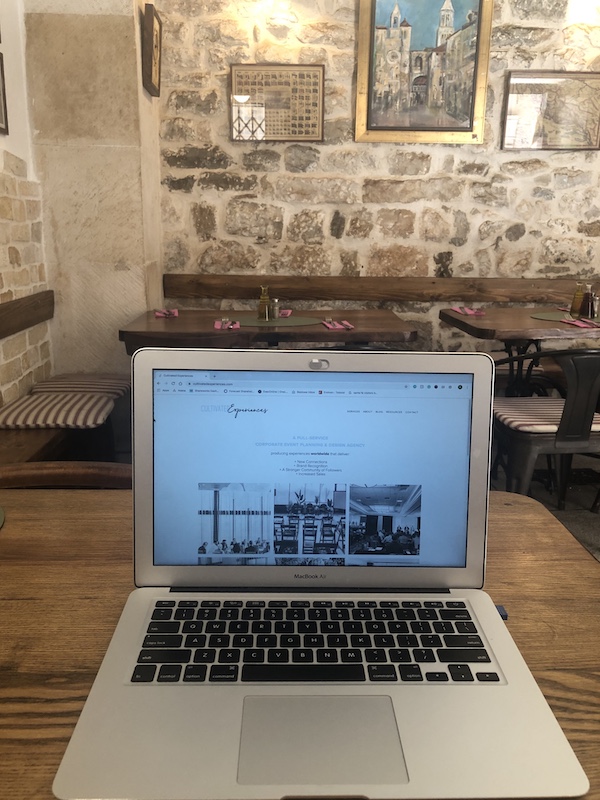
I am so glad that I chose Split as one of the first stops on my digital nomad journey - it’s been easy to feel at home while exciting to explore so many gorgeous new places.
Anything else you want to add.
Follow my journey of growing an online service-based business while traveling the world at @cultivatedexperiences.
To learn more about Croatia for the digital nomad, check out the Total Croatia Digital Nomad guide.
Are you a digital nomad in Croatia who would like to be featured in this series? Please contact us on This email address is being protected from spambots. You need JavaScript enabled to view it.
Digital Nomad Life in Croatia: Chris, from Colorado to Split
June 21, 2019 - As the number of digital nomads rises globally, some are choosing to spend some of their time in Croatia. A new TCN series meeting international digital nomads calling Croatia their temporary home. We start with Chris Mendenhall from Colorado.
As recently featured on TCN, the world is projected to have a billion digital nomads by 2035, people from all over the world doing all manner of jobs and business with one thing in common - a flexible, mobile workplace connected to the Internet. If even a fracture of that number becomes a reality, the economic opportunity for countries which can attract these wealth-generating individuals has the potential to dwarf Croatia's current tourism revenues. And there are few countries better placed than Croatia to take advantage. Safe, beautiful, great gourmet scene, top tourist destination, English widely spoken, well connected to other destinations, and a superb lifestyle.
In order to look at the issue in more detail, we have decided to look at some of the digital nomads who have Croatia in their lifestyle plan, and to find out why Croatia, what Croatia offers, and what are the things that countries should be looking out for to take advantage of this economic opportunity. I am very grateful to Tanja Polegubic from Split's waterfront co-working space, Saltwater in Split (see location below) for her help in connecting me to various digital nomads using her space.
I am also very grateful to Chris Mendenhall from Colorada for being the first in the series. A really nice story of have laptop, will travel out of the box.
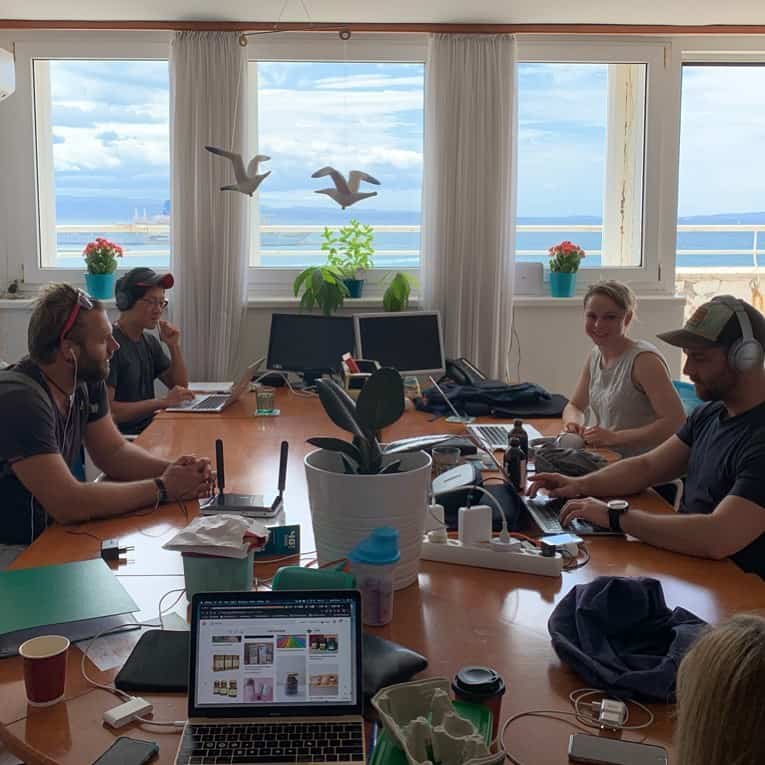
You are one of a growing number of digital nomads. Tell us briefly who you are and what you do.
I have what I call a “freelance office services business” based in Colorado. That means I do all kinds of administrative (secretarial, bookkeeping, etc.) work for small businesses that need help but don’t necessarily need to hire a full-time person. The piecemeal work from all 10 of my clients fills my time nicely. When I realized that I do most of my work on my own laptop and that I could do it from anywhere, I decided to spend a year doing it from Europe!
I’m not the typical digital nomad who never plans to call one port home. I am a 55-year-old woman with a home I plan to return to at the end of my year abroad. Before this trip, I was a creature of habit and routine who enjoyed roots and familiarity. This trip has taught me a great deal about flexibility, freedom, and the possibilities that await outside the confines of a “normal” life.
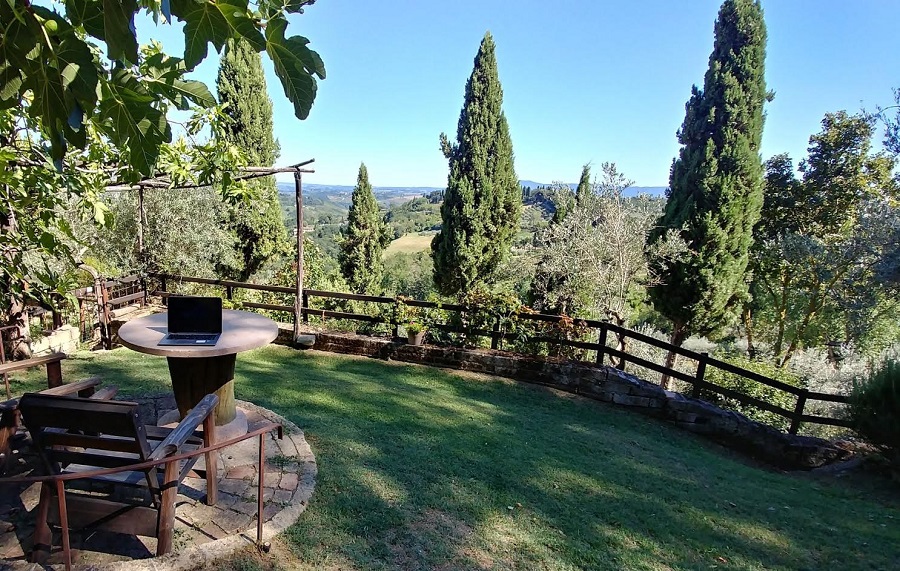
Working from your laptop rather than in an office seems like the dream lifestyle. What are the main pros and cons?
It has been fantastic! When I worked from home, I mostly felt tied to my home office, but being in different locations has made me get out among people and work in coffee shops, coworking spaces, libraries, parks, etc. Cons: I don’t always have everything I need at my disposal (like notes I forgot to bring or a printer, although I rarely need a printer); some locations like coffee shops can be distracting and you feel like you need to keep buying coffee; working from coworking spaces can be expensive compared to your own house; not having the perfect desk set up, especially if ergonomics is important to you.
Pros: variety; flexibility; opportunities to meet many different people; inspiration; letting my environment keep my work fun and interesting.
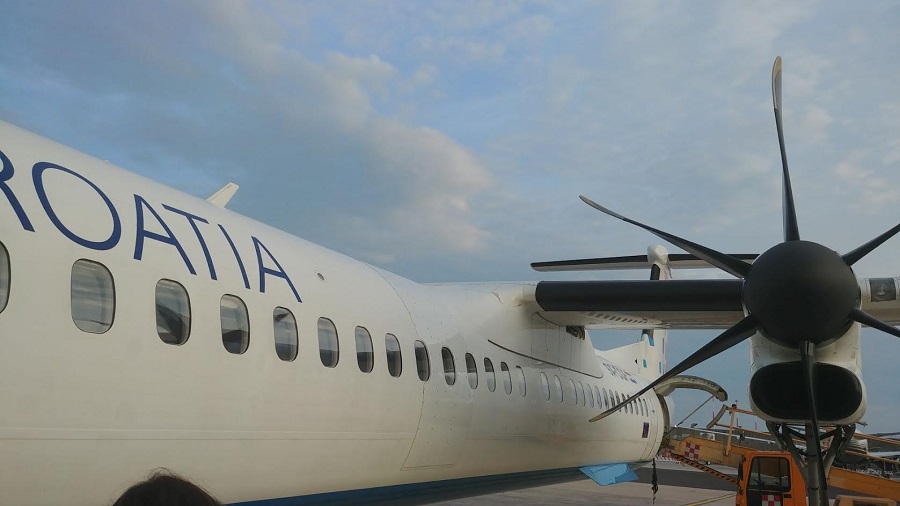
Laptop living gives you the freedom to travel and choose your place to live. Where are the global hot spots currently for digital nomads?
I can’t speak to the global hot spots for other people, but I’ll say that every city I’ve visited has had its own charm and benefits, and it that is the very element that adds to the nomadic appeal. The factors that determine the ease of working remotely include good public transportation, good wifi, and a centrally-located apartment. If it is too hard or time-consuming to get to good places to work, you lose a lot of time just moving around. When that has happened for me, I ended up working alone in my apartment, which I could have done from home.
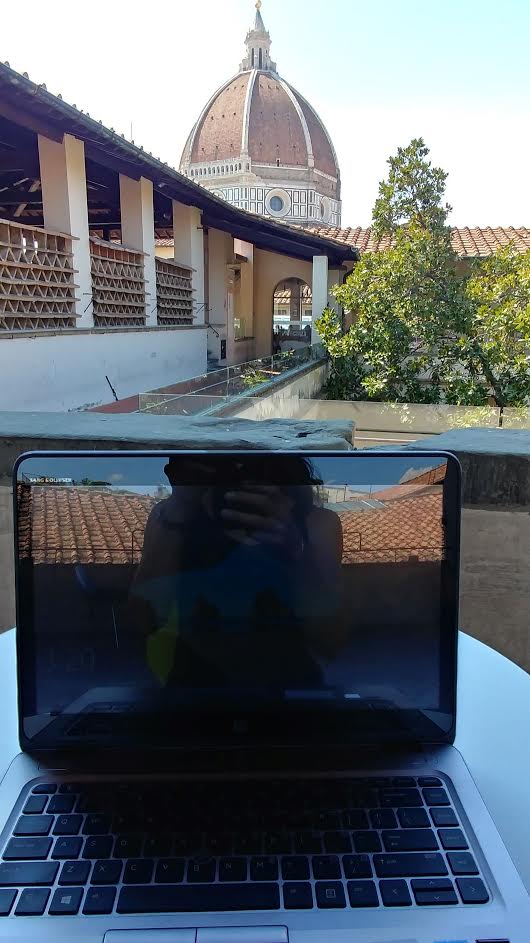
You chose Croatia and specifically Split - why?
I chose Croatia because I needed a non-Schengen country to pass the time before I could go back to the Schengen countries that I thought I came to Europe for. A number of friends had recommended Croatia because of recent trips there. Word is quickly getting out about what a fabulous tourist destination it is and folks are interested to see it before the crush of tourism in more well-known European countries seeps toward the Adriatic Sea. Most people recommended Dubrovnik, but I chose Split because it was slightly more centrally located in case I wanted to visit farther north and because it was bigger than Dubrovnik, I thought it might offer more amenities than just what a pretty Old Town might.
Split was a perfect choice because unlike many coastal Croatian towns that I visited over the winter, Split retains its lively community year around. Public transportation within the city and to other nearby destinations is great, and the cafes, shops, restaurants and bars remained open and offered plenty of shopping, entertainment, and culinary options. Of course, the natural beauty of the coast was delightful and especially appreciated in the winter. Through word of mouth, I knew of two coworking spaces before I even got there (Saltwater and Amosfera), and they not only provided places to work, but a thriving network of professionals and fun individuals. I attended several events and activities connected with those two spaces and met some wonderful people.
Coworking individuals and digital nomads tend to be fairly young and while I really enjoyed that vibrancy, I also appreciated that Split has a number of older people who have moved there to retire. That meant that between those with flexible work schedules and those done with working entirely, it was easy to find someone at any moment to call for a coffee or a walk or an excursion! My life in Split was rich, well-connected, entertaining, and beautiful!
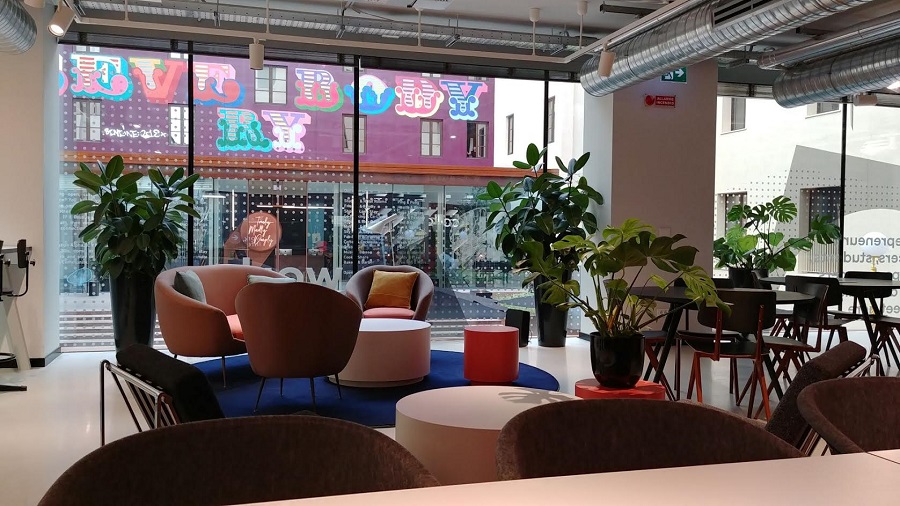
What are the most important things a destination should offer to be most compatible for the digital nomad lifestyle, apart from that all-important good WiFi?
Again, public transportation is really helpful. If a city has a bikeshare program (like the amazing Mobike system in Florence, Italy), that makes getting around much easier. Coworking spaces that host networking opportunities or provide an atmosphere of shared interests (rather than just office space) make a huge difference, especially if they offer short-term memberships. Plenty of cafes are key and if they offer wifi and outlets, all the better. Gyms or yoga studios are a plus. Parks, green spaces, and the coastline provide sanity for me.
What are the competitive advantages that Croatia has to attract more digital nomads?
Croatia, and Split specifically, offers a beautiful, unique environment even during the winter months. People are friendly and prices are reasonable. Most people working remotely are not raking in an exorbitant income, so working in expensive cities can be a burden. I loved the green market and the fish market in Split, and there are super cheap movies in the theater in the center of town. Festivals and events keep things entertaining, but can make lodging and dining challenging. I loved that there were so many beautiful places to visit just an easy bus ride away from Split. Split also has an active expat Facebook community that made meeting friends easy, both expats and locals. Meetup.com also provides great opportunities for meeting other people.
I have been so inspired by the creative and collaborative communities found in coworking spaces throughout Europe that I’m considering running one of my own when I return to Colorado.
You can follow Chris' digital nomad journey through Europe on her blog, From One Little Idea.
To learn more about Croatia for the digital nomad, check out the Total Croatia Digital Nomad guide.
Are you a digital nomad in Croatia who would like to be featured in this series? Please contact us on This email address is being protected from spambots. You need JavaScript enabled to view it.



